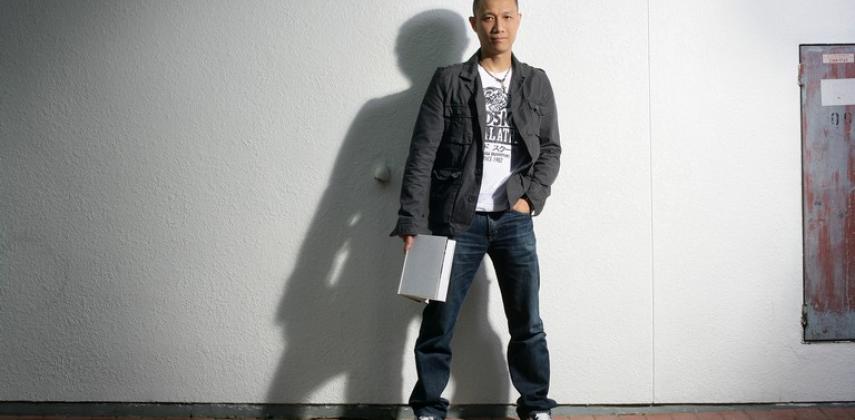Novelist and pop lyricist Jozev Lau, who edited a wuxia magazine in the early 1990s while studying translation at City University (CityU), has returned to his literary roots with his best-selling epic period series, Blood and Steel, which weaves knowledge of real martial arts into wuxia fiction.
The series has been a surprise hit, given that wuxia as a literary form seems to have been marginalised in recent years. Growing up watching movies and reading manga, Lau brings a modern twist to this traditional genre with fast-paced storytelling and testosterone-driven action.
The latest and eighth instalment of the Blood and Steel series - and its manga adaptation - will be released this month.
What convinced you to focus on writing as a career?
When I studied translation at CityU, there was an instructor who, one day, assigned the class an essay topic. I turned in a short novel, just for fun, but she was impressed. She gave me plenty of positive comments and encouraged me to pursue a career in writing. My buddy's cousin was a publisher who wanted to set up a wuxia magazine. Eventually, I became responsible for the editing and writing of the magazine. Those were the days of fiery passion: I went to classes during the day and edited the magazine at night. I was very determined to become a writer and wanted to have my novels published.
How did you build your career?
I published my first book in 1996 and, over the next six months, I published another two novels. Then I spent the next 10 years writing 10 books for an independent publisher, but the results were far from satisfactory. The local market is dominated by chain bookstores, and smaller publishers often lack the support and bargaining power to deal with them. If your books don't find a footing in these chains, sales will be severely hurt. My publisher, who is my friend, asked me to switch to a larger publisher who is publishing my current series of wuxia novels. That helps because the latter has already built a solid reputation, thanks to its best-selling titles on the stock market and finance.
Having written for more than a decade, I realise that the local literary market is rather narrow and the traditional genres, such as romance, martial arts and detective novels, are more readily accepted by readers. I have a great passion for martial arts novels. Since very few people have been working in this genre in recent years, I think I may be capable of filling the void.
What are the challenges?
The income for new writers struggling to break into the market is minimal. My first published novel sold about 1,000 copies and I really didn't know if I had a future as a novelist. But the funny thing about the creative industry is that one opportunity often leads to another. Every time I find myself running out of money, there are some creative side jobs available.
I was very lucky because a friend was a friend of pop singer Candy Lo, who was preparing her debut album and was looking for new lyricists for fresh ideas. I wrote lyrics for one of her numbers and her producer, pleased with the results, asked me to pen for another song, which led to more opportunities for writing lyrics. The 1990s was still the heyday of Canto-pop and my income as a lyricist was good enough for me to get by.
Writing is a lonely business because no one can help you during the creative process, which can be torturously long. Insecurity can seep in any moment and you have to be mentally strong and independent. You must have faith in your work, believing that chances of a breakthrough are just around the corner. Such self-confidence is essential for a writer to keep going.
What is the best part of your job?
I like writing and reading and I derive great satisfaction from creating work of my own. Every novel is unique and it will always be part of my legacy. I also find it very satisfying that my stories resonate with my readers. After all, writing is about communicating with others.
What is your secret to success?
Writing novels has always been the top of my priority list. The magazine and newspaper columns, comic book franchise and movies are just extensions of my career as a novelist, and I firmly believe that writing novels is my strength. It is the root of my career and is my most important asset. I think that is very important because many Hongkongers tend to forget what they are truly good at and succumb to the temptation of profitable opportunities. For instance, many companies have plunged into the business of speculation even if their strength lies elsewhere, and they ended up going bankrupt. Managing one’s career is similar to managing a company, and the most important thing is not to mix up your priorities.
What’s your advice to young people?
If you really want to do something, be brave and give it a try. It’s interesting that many university students would choose a major according to job market trends. That is unnecessary because the world keeps changing and even if you are in a booming business I don’t think you could earn much unless you are among the very best. Therefore, I think it is more important to find something that suits your talent and interests. That means searching within yourself to find out what you can do best and then look for opportunities to develop a career out of it.
Busy scribe
- Every day, Lau spends two to three intensive hours writing about 2,000 words for his novels
- He also writes columns for newspapers and magazines
- He connects with readers by spending at least two hours a day updating his blog and Facebook
- He enjoys reading books, going to movies and watching the news


